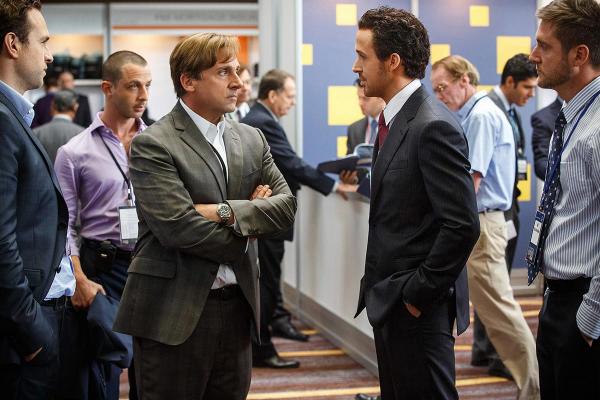In Matthew 6:24, Jesus reminds us that we cannot serve both God and money. Serving money above all else means that we pursue our own greed, usually at the expense of others’ well being. To serve God is to care for our brothers and sisters. To serve money is to forget that their problems exist.
Director Adam McKay’s new film The Big Short, about the events leading up to the 2008 economic collapse, is a scathing indictment of the culture of greed, shortsightedness, and self-interest that allowed millions of people to lose their jobs and homes. It’s a comedy, but one whose dark humor derives from a passionate sense of disappointment and anger.
The film, based on the nonfiction book by Michael Lewis, is the story of the men who predicted the 2008 collapse before it happened, betting on the failure of mortgage-backed securities at a time when the housing market was supposedly watertight. Michael Burry (Christian Bale) is a math-whiz hedge fund manager who sees an opportunity to game the system. Mark Baum (Steve Carell), another hedge fund manager, is a crusader against corruption, and hopes to catch Wall Street with their pants down. Two young upstart investors (Finn Wittrock and John Magaro), under the guidance of a former banker (Brad Pitt), are looking to grow their capital. Jared Vennett (Ryan Gosling), who also serves as our narrator, is just in it for the money.
In each of these cases, the characters lose sight of the people who will ultimately suffer when the market crumbles. They’re all motivated, in one form or another, by money. Some of the characters want to make it; some of them want to punish others for wanting it too much. Others want to be known for being good with it. Only when their gamble finally pays off do these men understand what the collapse means for the rest of the country.
Director McKay spends much of the film’s running time explaining the complicated workings of the financial sector. His progressive politics and command of the pop culture zeitgeist (he’s the guy behind Anchorman and Talladega Nights) make him uniquely qualified to do this in an entertaining way, and it really works.
McKay uses celebrity cameos, flashy editing, and cheeky fourth-wall breaks from Gosling and other characters to effectively explain what’s happening to audiences with even the shortest attention spans.
But the writer-director never drops his focus on those who had the most to lose. McKay slips in frequent reminders of what was to come, whether it’s an establishing shot of a banking conference, with homeless people camped just outside, a sobering speech, or an interview with someone who, unbeknownst to them, is about to lose their home.
Once it all does come tumbling down, the reality of the situation hits not so much like a punch to the gut as to the solar plexus — it leaves you winded. We’re reminded that the collapse left 6 million people homeless, and 8 million people unemployed, and that even after all the cheating and swindling that happened, only one banker actually went to jail.
On the surface, The Big Short works as a fascinating exploration and demystification of the mortgage crisis. It takes a crazily complicated topic and breaks it down into understandable chunks.
But Adam McKay doesn’t want to just explain banking terms. He wants audiences to understand that the economic problems we’ve experienced since 2008 stem from the actions of greedy, detached, privileged people. That people who claimed to manage the interests of others had only themselves in mind. The Big Short reminds us, powerfully and painfully, that you can’t serve both God and money, because money won’t let you serve anyone but yourself.
Got something to say about what you're reading? We value your feedback!

